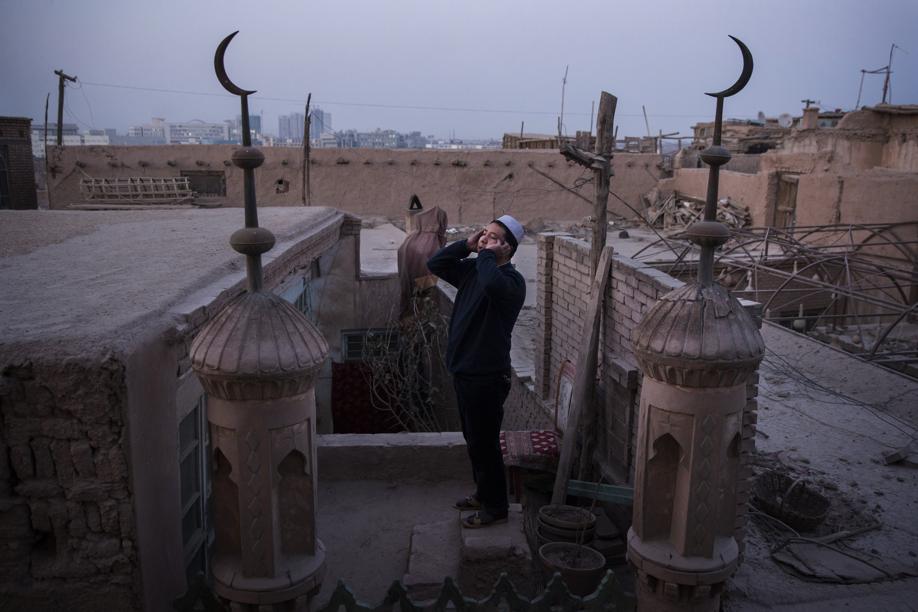
KASHGAR, China — Families sundered by a wave of detentions. Mosques barred from broadcasting the call to prayer. Restrictions on the movements of laborers that have wreaked havoc on local agriculture. And a battery of ever more intrusive ways to monitor the communications of citizens for possible threats to public security.
A recent 10-day journey across the Xinjiang region in the far west of China revealed a society seething with anger and trepidation as the government, alarmed by a slow-boil insurgency that has claimed hundreds of lives, has introduced unprecedented measures aimed at shaping the behavior and beliefs of China’s 10 million Uighurs, a Turkic-speaking Muslim minority that considers this region its homeland.
Driving these policies is the government’s view that tougher security and tighter restraints on the practice of Islam are the best way to stem a wave of violence that included a knife attack on a coal mine that killed dozens of people in September.
The tough security measures are on full view for travelers as they stop at the ubiquitous highway checkpoints that slow movement across this rugged expanse of deserts and snowy peaks.
As heavily armed soldiers rummage through car trunks and examine identification cards, ethnic Uighur motorists and their passengers are sometimes asked to hand over their cellphones so police can search them for content or software deemed a threat to public security.
In addition to jihadi videos, the police are on the lookout for Skype and WhatsApp, apps popular with those who communicate with friends and relatives outside China, and for software that allows users to access blocked websites.
“All of us have become terror suspects,’’ said a 23-year-old Uighur engineering student who said he was detained overnight last month after the police found messages he had exchanged with a friend in Turkey. “These days, even receiving phone calls from overseas is enough to warrant a visit from state security.’’
Here in Kashgar, the fabled Silk Road outpost near China’s border with Pakistan and Afghanistan, officials have banned mosques from broadcasting the call to prayer, forcing muezzins to shout out the invocation five times a day from rooftops across the city. The new rule is an addition to longstanding policies that prohibit after-school religious classes and children under 18 from entering mosques. (The installation of video cameras on mosque doorways in recent months makes such rules hard to ignore.)
Southeast of Kashgar, shopkeepers in the city of Hotan seethed over a government decision to outlaw two dozen names considered too Muslim, forcing parents to rename their children or be unable to register them for school, according to local residents and the police.
To the north in Turpan, a fertile oasis famed for its grapes, a vineyard owner complained about new restrictions that bar Uighur migrant laborers from traveling there for the harvest, leaving tons of fruit to wither on the vines.
And farther north in Ghulja, an ethnically diverse city near the Kazakh border with a history of tensions, a pair of unemployed college graduates fumed about a crackdown prohibiting young men from wearing beards and women from veiling their faces. Those who ignore the rules are sometimes jailed, residents said.
“Me, myself, I’m not religious, but forcing our women to take off their head scarves is an affront to their dignity and makes many people angry,’’ said one of the men, who, like others interviewed, asked to remain anonymous for fear of punishment by the authorities.
Other measures contribute to the widespread perception that Uighur identity is under siege. Schools have largely switched to Mandarin as the main language of instruction instead of Uighur, and the government has begun offering cash and housing subsidies to encourage intermarriage between Uighurs and Hans, the country’s ethnic majority, who have migrated to the region in large numbers.
Surveillance, too, has been increased. Since 2014, Uighurs seeking to travel outside their hometowns have been required to carry a special card that lists phone numbers for the holder’s landlord and local police station. Many Uighurs complain that these “convenience contact cards,’’ as they are called, single them out for scrutiny.
“The state’s ability to penetrate Uighur society has become increasingly sophisticated and intrusive,’’ said James Leibold, an expert on China’s ethnic politics at La Trobe University in Melbourne, Australia. “But while these new measures allow the party to nip a lot of problems in the bud, they also foster new forms of alienation and violence that ultimately weaken the party’s legitimacy and rule.’’


 PREVIOUS ARTICLE
PREVIOUS ARTICLE